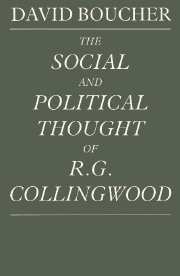Book contents
- Frontmatter
- Contents
- Preface
- 1 Collingwood in context
- 2 The New Leviathan in context
- 3 The two Leviathans and the criteria of rational action
- 4 The development of the European mind
- 5 Collingwood's liberal politics
- 6 The state and the body politic
- 7 The process of civilization
- 8 Conclusion: civilization and its enemies
- Notes
- Index
6 - The state and the body politic
Published online by Cambridge University Press: 05 June 2012
- Frontmatter
- Contents
- Preface
- 1 Collingwood in context
- 2 The New Leviathan in context
- 3 The two Leviathans and the criteria of rational action
- 4 The development of the European mind
- 5 Collingwood's liberal politics
- 6 The state and the body politic
- 7 The process of civilization
- 8 Conclusion: civilization and its enemies
- Notes
- Index
Summary
Introduction
In the preceding chapter we saw that Collingwood identified a defect in the classical politics of Hobbes, Locke, and Rousseau. They failed to provide a theory of the nonsocial community and thus ignored the important question of how a society can continually recruit new members for itself who are mentally mature and responsible, and who can exercise their free will in the joint enterprise of ruling. Collingwood's solution to the problem that the classical theorists failed to address was thoroughly imbued with the liberal principles of the idealists, from whom he derived philosophical as well as political inspiration. This chapter looks at how Collingwood's theories of mind and society have a direct bearing upon the role of the state in the body politic; the place of punishment in preventing a reversion to the nonsocial community; and the relations between bodies politic.
The state as activity
In Collingwood's view, the state, understood as substance – that is, as an entity having certain functions, characteristics, and attributes – provides the focus for the empirical study of politics. Croce, in believing that the sphere of ‘political action is co-existensive with that of useful action’, denies that the state as a focus of attention can adequately demarcate the political from the nonpolitical in human life. He says, for example, that ‘there exists … not the State, but political actions’. Collingwood, while disagreeing with Croce's identification of the political and the useful, nevertheless agrees with him in viewing the philosophical understanding of politics not as a theory of the state but as a theory of political activity.
- Type
- Chapter
- Information
- The Social and Political Thought of R. G. Collingwood , pp. 167 - 194Publisher: Cambridge University PressPrint publication year: 1989



